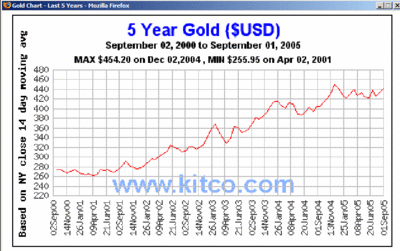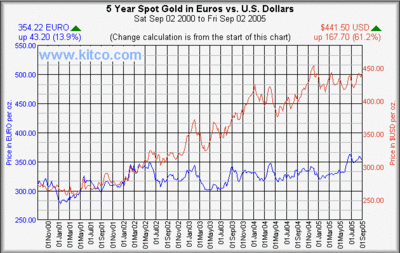Cause and Effect
I will admit that a big part of this blog is self-serving - I want to document all of my trading and investment ideas in order to hone my skills and become a more effective trader/investor.
In order to have the maximum effect however, I need to be able to clearly articulate my investment themes and the logic behind them. I received an e-mail from a reader last night who did not understand how "gold worked." At first glance this may seem like an easy question answer- but it is far from that.
I am going to try and outline a few of the main concepts that should come to mind when we think of gold - why I like it in the current economic environment and some of the risks involved with:
1) First - what is gold? It is a commodity-a precious metal which is traded along with other precious metals on the worlds financial markets. Traditionally gold has been revered as a store of value - some people call it the only true currency. There are cites to facts like an ounce of gold will buy the same today as it did in 1200 AD. I don't know if that is true - but I do agree that gold typically reacts positively when news comes out regarding inflation hitting the economy.
2) What is gold priced in? Dollars, yen, euros, etc. Gold is traded throughout the world in every currency imaginable. The most interesting thing about the whole system - is that Gold may be appreciating in the value of one currency and declining or remaining stable in the value of another. Example: From 2001-2004 during a period when the dollar lost a lot of its value against the Euro - it was also losing value against Gold. However, if you were to value gold in Euros - its value remained relatively level during this period. Here are some charts:


There are different types of exchange rate regimes which are possible - mainly fixed and floating. During the past 30 years we have operated under a floating excanged rate system with a paper currency. In other words - the value of the dollar has value - because people accept it implicitly to be worth something. It is not exchangeable for X ounces of gold or silver the local bank - instead it is only valuable so long as someone will accept it as payment.
Most currencies in the world operate under a floating exchange rate regime and their purchasing power rises or falls along with the demand and supply for that currency. Between 1995 and 2001 - the USA had very strong financial market returns and international investors chasing that performance had to sell their own currencies and purchase dollars in order to pursue those opportunities that resulted in an artificially strong dollar.
As financial market and investment returns have diminished over the past five years- along with the decline in interest rates - investors have had few reasons to hold dollars. Investors have instead chosen to sell dollars and purchase other currencies, commodities, or real estate.
There is a strong case to be made that much of the returns in those areas since 2002 to present can be explained by the huge drop in both nominal and real interest rates in the United States. To keep from getting any more off topic - I thouht the above would be useful to explain that so long as the purchasing power of the dollar is declining as manifested in rising prices of commodities, real estate, inflation, etc. - gold should perform well. (that last thought's logic was a bit circular - but I think it made sense).
Comments please - I really want to see if people are on same page?
Regards,
BG
![[Most Recent Quotes from www.kitco.com]](http://www.kitconet.com/images/live/s_gold.gif)
![[Most Recent Quotes from www.kitco.com]](http://www.kitconet.com/images/live/s_silv.gif)

0 Comments:
Post a Comment
<< Home